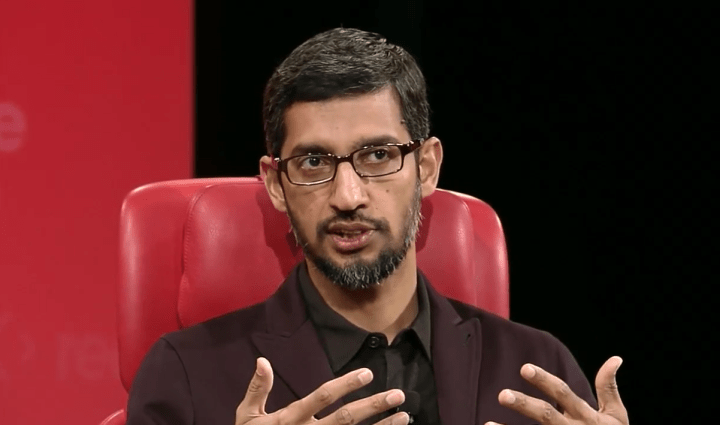
We’ve put together a roundup of the most interesting parts of their 30-minute conversation, which you can watch here.
Artificial Intelligence

Google has been working with deep neural networks for a long time. The search giant also has logged an “order of magnitude higher number of queries compared to anyone else.” Through scale and usage today, the company believes it is well ahead of its competition in artificial intelligence and machine learning.
But Sundar Pichai isn’t willing to go out and claim the Mountain View, California, company is better than competitors like Amazon, Apple, and
“It’s not like Game of Thrones — it’s more like the NBA championships, or something like that.” Pichai said the company does a variety of benchmarking studies and generally feels ahead of the competition.
Pichai believes we’re in a transitional computing period where we’re learning to move past physical devices and screens. Now, we expect our AI-powered technology to “be there ambiently in context” working for us. He says this is happening right now.
Mossberg also complained that Google did a poor job of branding Google Now — considering that other tech giants have marketable names for these assistants like Cortana, Siri, and Alexa. But Pichai responded that since the technology is in the early days, the company didn’t want to “constrain” itself to giving the technology a specific name. Pichai said he envisioned each person having their own version of Google.
Google Home

Google Home is the search giant’s answer to Amazon’s Echo. It’s an always-on device that will sit in the home, and it’s powered by Google Assistant. It’s meant to help with all sorts of tasks, from adding items to your shopping list to casting a YouTube video to your TV. Pichai says a true assistant can participate in a two-way dialogue, and that’s what he hopes Home will become.
“In the next 5 to 10 years, building true conversational understanding and being able to have the dialogue is where we plan to differentiate,” he said. “The hardware is just a manifestation of that … we want to help people get things done.”
Privacy

But what about the people who worry about bringing Google into their homes? Privacy is a big issue with companies that rely on user data. Google faced backlash for not enabling end-to-end encryption by default in its upcoming Allo messenger, but the company said it could not if people wanted to benefit from
Pichai took Google Photos as an example and said it was adopted “phenomenally well.” The onus is on Google to provide enough value that people trust the company, and machine learning and AI can help the company improve privacy in its services. For the time being, Google is all about giving users a choice — such as with Incognito Mode in Allo and Chrome.
“You should be able to tell Google, ‘Hey maybe the last four hours — just take that off and go off the record,” he said. A few media outlets have reported that Google Home will feature an Incognito Mode, but a source familiar to the matter told Digital Trends that this is not the case. Pichai was simply speaking in broader terms and about future possibilities with Google. Home will have a physical mute button that will turn off the microphone.
When asked if Google can pry away the crown from Amazon’s Alexa-powered Echo in this space, Pichai is fairly certain it’s possible. He said
“You take a very long-term view and you invest and you bring your strengths to it,” Pichai said. “If you peel away everything and distill it, this is the heart of what we do — it’s what we are about.”
Android and Nexus
Pichai didn’t dive into too much about
Pichai didn’t outright say the company has no plans to make its own Nexus device, but he said the company is “investing more effort into them.”
“You’ll see us put a lot more thought into our Nexus devices going forward,” he said. “We’ll be opinionated where we need to be so we push the category forward.”
What does that mean? Rather than solely shipping Nexus devices with stock
Regardless, Google’s plan is to still work with manufacturers to make phones.
On the topic of
Google is also working with carriers to improve Rich Communication Services messaging, to bring texting up to date. Pichai says he hopes that
China
China is a market that every major player in the tech industry wants a piece of. Pichai said Google does have a presence and employees in China, as it supports advertising and analytics for
But he remarked that Google is open to negotiating with the Chinese government to bring its services like Google Search to the country. Google is reportedly planning on bringing a stripped-down version of the Google Play Store to China some time this year or next.
“I care about serving users globally in every corner … that applies to China,” Pichai said.
EU and Oracle

Mossberg opened the conversation to questions from the audience — two people brought up Oracle and the European Union. If you weren’t aware, a jury handed a huge victory to Google over Oracle. Oracle claimed Google didn’t pay to use its Java APIs, and Google countered that the software fell under “fair use,” as it was open source when it was developed by Sun Microsystems, before Oracle bought it. Pichai said the victory was important for any developer that utilized open -ource software.
The European Union is also going after
“I’m comfortable that the framework will allow for us to work it out through,” he said. “At the end of the day … it’s a position we feel fortunate to be in — we are very, very popular and users use us a lot, and that’s the context in which all these questions get asked. These are fair questions and the process is thoughtful, and I am personally engaged on it.”


